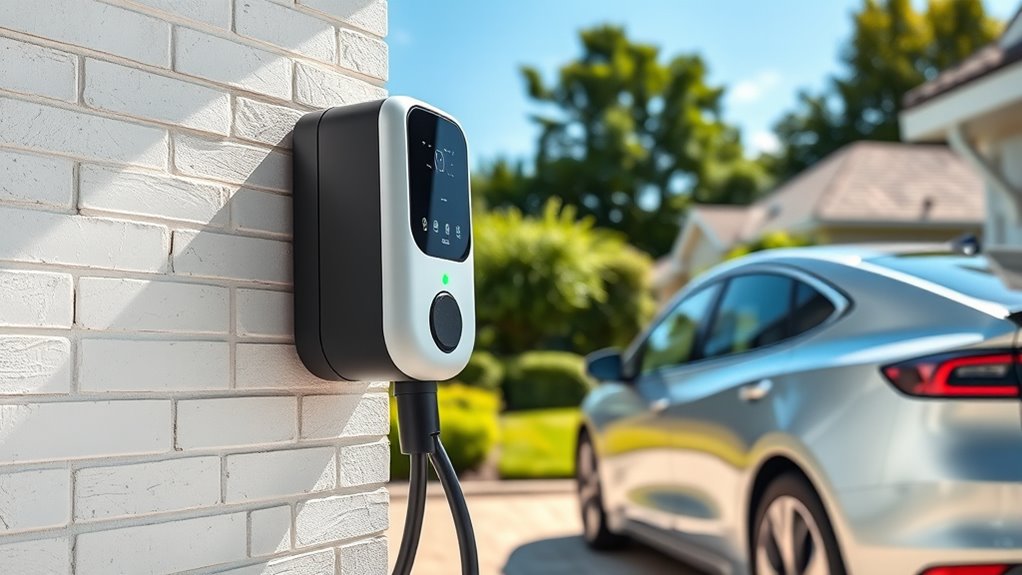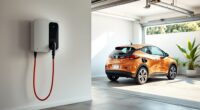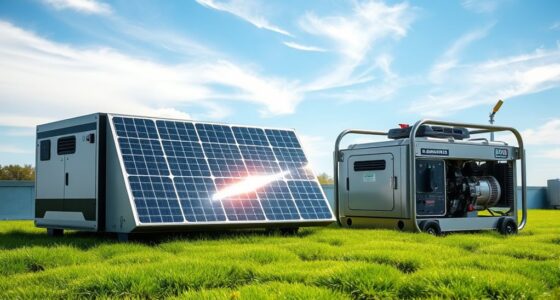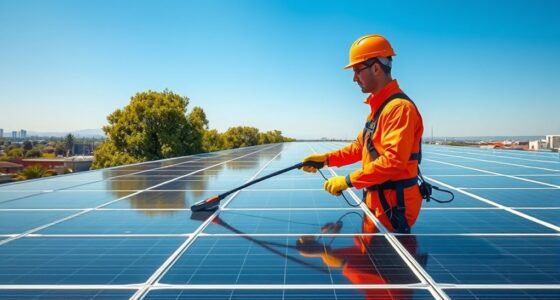To choose a home EV charger, consider your vehicle’s charging capabilities and the electrical capacity of your home. Decide between Level 1 or Level 2 chargers based on how quickly you want to charge—Level 2 offers faster charging with 240V outlets. Check compatibility with your vehicle’s connector and verify your electrical system can support the charger’s power needs. For more tips on selecting the right charger, keep exploring your options.
Key Takeaways
- Match the charger’s power output (Level 1, 2, or DC fast) to your vehicle’s charging capabilities and daily needs.
- Ensure your home’s electrical system can support the charger’s voltage and current requirements, possibly requiring upgrades.
- Choose a reputable brand with reliable safety certifications (UL) and consider smart features for remote control and monitoring.
- Select a weather-resistant charger and determine an accessible, safe location with an appropriate cable length for convenience.
- Factor in installation costs, regional incentives, and long-term savings when budgeting for your home EV charging setup.
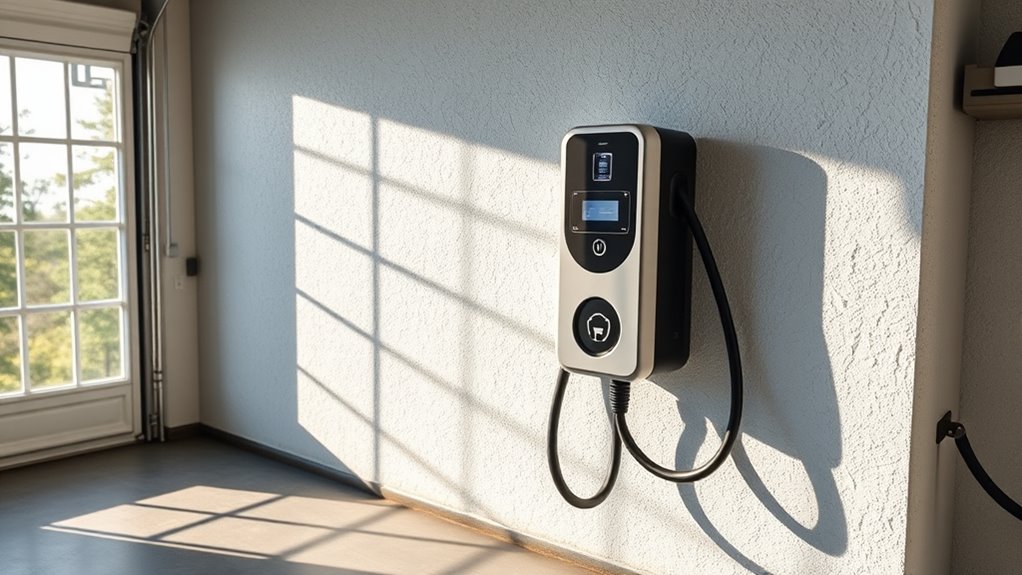
Choosing an EV charger is a essential step in making the most of your electric vehicle. The type of charger you select influences how quickly you can recharge your car and how conveniently you do it. There are three main options to consider: Level 1, Level 2, and DC Fast Chargers. Level 1 chargers connect to a standard 120V AC outlet, providing about 1 kW of power. While they’re inexpensive and easy to set up, they can take anywhere from 40 to 50 hours to charge a typical battery to 80%. If you’re looking for faster home charging, Level 2 chargers are the way to go. Operating at higher voltages—208 to 240V AC—they offer between 7 and 19 kW, reducing charging time to roughly 4 to 10 hours. These chargers use the J1772 connector, compatible with most electric vehicles, making them a popular choice for home installations.
Choosing the right EV charger impacts charging speed and convenience, with Level 1, Level 2, and DC Fast options available.
When choosing a charger, pay attention to its power output because it directly affects how fast your vehicle charges. Higher wattage means less time plugged in. Also, consider the brand—Tesla, ChargePoint, and Grizzl-E are well-known for reliability and support. Budget-wise, chargers typically cost between $300 and $800, with smart chargers offering added connectivity features for remote control and monitoring. Longer cables provide more flexibility in placing your charger, especially if your parking spot isn’t right next to the electrical panel.
Installation requirements are essential to guarantee safety and proper functionality. Make sure your home’s electrical system can support the charger’s power needs, which may involve upgrading your electrical panel. Hiring a certified electrician is necessary for safe installation, particularly if you’re installing a Level 2 or higher-powered charger. You’ll need to obtain permits and ensure the setup complies with local electrical codes. Pick a location that’s accessible and safe, ideally sheltered from weather if the charger isn’t weather-resistant. Proper grounding and safety certifications like UL approval are non-negotiable to prevent electrical shocks or fire hazards.
Compatibility with your vehicle is another key factor. Confirm that the charger’s connector matches your EV’s charging port—most use J1772, but some vehicles, particularly Tesla, may require adapters or proprietary connectors like NACS. Match the charging speed to your vehicle’s capabilities to avoid underutilizing or overloading its charging system. Always check the manufacturer’s recommendations for best performance and safety. Additionally, paying attention to charging standards ensures compatibility and optimal performance with your specific EV model.
Cost considerations extend beyond the purchase price. You might qualify for regional tax credits or incentives that reduce upfront costs. Remember to factor in installation costs, which vary based on complexity, and the long-term savings from lower fuel expenses. Proper maintenance, warranty coverage, and reliable customer support will guarantee your charger remains functional and safe over time. Taking these factors into account will help you select the best EV charger for your home, maximizing convenience and efficiency in your electric vehicle experience.
Frequently Asked Questions
What Is the Average Installation Time for a Home EV Charger?
The average installation time for a home EV charger is typically around 2 to 3 hours. You should keep in mind that factors like your home’s electrical setup, the charger type, and whether additional cabling or underground work is needed can extend this timeframe. To make certain a smooth process, it’s best to hire a professional installer who can handle any complexities efficiently. Proper preparation can also help speed things up.
Can I Upgrade My Existing Charger Later?
Thinking you’ll never upgrade your EV charger? Think again! You can definitely upgrade later, but it depends on your current setup. Compatibility matters—ensure new features like higher power levels or smart tech work with your existing wiring. Sometimes, upgrades need panel or wiring improvements, so plan ahead. With smart planning, future-proofing, and a bit of patience, your charger can evolve with your needs, saving you money and headaches down the road.
Are There Any Government Rebates or Incentives Available?
You’re wondering if government rebates or incentives can help with your EV charger purchase. Good news—federal tax credits cover 30% of installation costs, up to $1,000, while many states and utilities offer additional rebates and incentives. Check resources like IRS.gov, your state energy department, or utility websites for details. Early research and proper documentation make sure you capitalize on these benefits, making your home charging setup more affordable.
How Does Charging Speed Vary Between Different Chargers?
Charging speed varies depending on the charger type you choose. Level 1 chargers are slow, adding only 3-5 miles of range per hour. Level 2 chargers are faster, providing 11-54 miles of range per hour, ideal for overnight charging. DC fast chargers are the quickest, capable of adding 80% charge in as little as 20-40 minutes, perfect for long trips. Your vehicle’s compatibility and battery size also influence charging speed.
What Safety Features Should I Look for in an EV Charger?
Oh, safety features in EV chargers? Because nothing says “fun” like risking an electrical shock or fire, right? Look for GFCI protection, automatic shut-offs, and proper grounding to keep you safe. Make certain it’s weather-resistant, has durable cables, and is certified by recognized labs. Don’t forget regular inspections and following manufacturer guidelines—because a safe charger isn’t just a good idea, it’s your best bet against disaster.
Conclusion
Choosing the right EV charger is like finding the perfect key to unseal your home’s full electric potential. You want it to fit seamlessly and work smoothly, powering your vehicle reliably. Take your time, consider your needs, and don’t settle for less. When you pick wisely, you’ll enjoy a charging experience that’s as effortless as turning a key in a lock—opening the door to a greener, more convenient future right from your own home.

